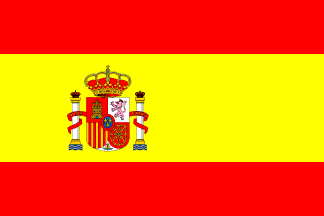On Solid Food
It's a famous passage from Scripture, the one about moving from spiritual milk to solid spiritual food. The guest speaker used it as part of his text this morning. Here's what I'm talking about:
Hebrews 5:12-6:2.(NIV).. In fact, though by this time you ought to be teachers, you need someone to teach you the elementary truths of God's word all over again. You need milk, not solid food! Anyone who lives on milk, being still an infant, is not acquainted with the teaching about righteousness. But solid food is for the mature, who by constant use have trained themselves to distinguish good from evil. Therefore let us leave the elementary teachings about Christ and go on to maturity, not laying again the foundation of
- repentance from acts that lead to death, and
- of faith in God,
- instruction about baptisms,
- the laying on of hands,
- the resurrection of the dead, and
- eternal judgment.
Couple things struck me as this was read in church. First, the definition of those who are mature as those who are able
to distinguish from good and evil. They are able to do this because they have
trained themselves through
constant use. Part of that goes back to what I was saying about practice the other day. It is the constant use of the skills and knowledge of God's will and work that help us develop maturity. Maturity itself is not seen here as the ability to be more holy or recite more scripture but to be able to distinguish good from evil. The ESV says that the mature have their
powers of discernment trained. Young's literal translation of the Greek says:
having the senses exercised. It is, in short, through the development of, the sharpening of the senses and powers God provides that we learn how to be mature- saying yes to good and no to evil.
Perhaps it is in this that the greatest difficulty comes in, however, from the secularization of our lives. We begin to take our cue from the secular. Whenever I have talked about sin in a confirmation class, most times "sin" is seen as "illegal."
- "Is smoking a sin?" I ask. Well, not if your over 18.
- "Is speeding a sin?" Well, ....
- "Is war a sin?" Oops. Now I'm meddling in politics.
Our powers of discernment, our spiritual senses are dulled, glossed over, by so much. To discern good and evil is more than the list of personal sins, more than breaking the law or The Law (10 Commandments, etc.) It is a deeper, more profound and definitely more mature action. Which is what we are being reminded of in the passage in Hebrews.
Yet, we get stuck, we are being told, on the foundation. We keep building the same foundation over and over and over. We don't move to the mature stuff. We don't add a framework and walls and a roof over our spiritual homes. We don't put furniture in. All we have are building blocks upon building blocks. The list of these basic building blocks gives us a direction about the "essentials":
- repentance from acts that lead to death,
- of faith in God,
- instruction about baptisms,
- the laying on of hands,
- the resurrection of the dead,
- eternal judgment.
These, it is assumed, we should know first and foremost in our spiritual lives. Only laying on of hands surprised me. Not because it shouldn't be there, but how that isn't very often seen as a basic teaching. It refers to the giving of the Holy Spirit. We do the action in baptism or confirmation or marriage, but we don't teach it as a basic. That may be why we often feel as if something is missing in our lives. Why we are searching so diligently for a spiritual "high" and why drug and alcohol abuse becomes a part of some lives. We are missing the power to do God's will if we miss the Holy Spirit and don't make the laying on of hands a basic teaching.
It takes work to get to a maturity of faith. It isn't an issue of salvation- that's in the acceptance of Jesus Christ as your Lord. It isn't an issue of having to earn a place in heaven. It is about growing and maturing and - through constant use, i.e. practice, practice, practice - allowing the ways of God to become more natural in our lives.
Know the basics. Then go deeper. Pray and study and read and carry out actions of faith and hope. Meet together and sing songs and spiritual psalms. Become accountable to each other and listen to the word God has spoken through each other. Allow the Spirit of God to be present through the laying on of hands and the powerful breath of the Creator will make all the difference as we mature and grow in our faith.
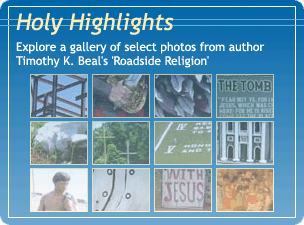



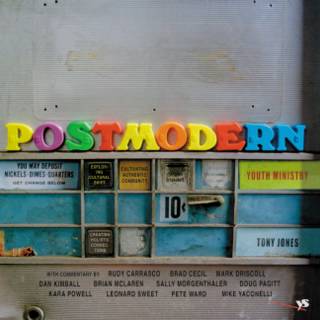



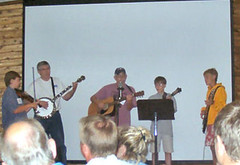 Well, this old postmodernPilgrim is playing guitar and singing in this picture from the jam camp this past weekend. It was a simple song, (Will the Circle Be Unbroken) done simply for us two older guys in the group. But we did it. The youth were gracious and more than helpful. The opportunity to be creative in a new area of music was a blast.
Well, this old postmodernPilgrim is playing guitar and singing in this picture from the jam camp this past weekend. It was a simple song, (Will the Circle Be Unbroken) done simply for us two older guys in the group. But we did it. The youth were gracious and more than helpful. The opportunity to be creative in a new area of music was a blast.
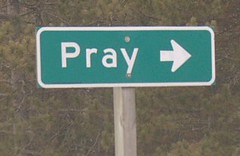


 Saturday was one of those wonderful days. I was at a wedding.
Saturday was one of those wonderful days. I was at a wedding. Over these years our two families along with the rest of our extended family-of-choice of the Watertown Moravian Church, helped each other through more ups and downs and slides and climbs than seems possible as we look back today. It was often more than just people who happened to be in the same church. Many times it was more than a pat-on-the-back. There were times we had to hold each other up when it seemed impossible to stand on one's own.Then, 5 1/2 years ago we moved to Minnesota and a new church. But you don't leave 15 years behind without a thought. Especially after so much together. And especially when God picks up the other family and moves them 25 miles down the road here in Minnesota. Not far from where our daughter now lives, also.
Over these years our two families along with the rest of our extended family-of-choice of the Watertown Moravian Church, helped each other through more ups and downs and slides and climbs than seems possible as we look back today. It was often more than just people who happened to be in the same church. Many times it was more than a pat-on-the-back. There were times we had to hold each other up when it seemed impossible to stand on one's own.Then, 5 1/2 years ago we moved to Minnesota and a new church. But you don't leave 15 years behind without a thought. Especially after so much together. And especially when God picks up the other family and moves them 25 miles down the road here in Minnesota. Not far from where our daughter now lives, also.  The family has continued. Jenn met Mike there and on Saturday they were married back at the church in Wisconsin with my wife officiating and our daughter in the wedding party. All kinds of "family" were around- biological, spiritual, and social.
The family has continued. Jenn met Mike there and on Saturday they were married back at the church in Wisconsin with my wife officiating and our daughter in the wedding party. All kinds of "family" were around- biological, spiritual, and social.

